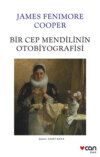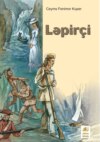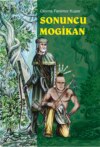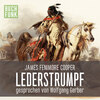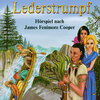Kitabı oku: «The Chainbearer: or, The Littlepage Manuscripts», sayfa 56
"The Great Spirit makes men differently," commenced Eaglesflight. "Some are like willows, that bend with the breeze, and are broken in the storm. Some are pines, with slender trunks, few branches, and a soft wood. Now and then there is an oak among them, which grows on the prairie, stretching its branches a great way, and making a pleasant shade. This wood is hard; it lasts a long time. Why has the Great Spirit made this difference in trees? – why does the Great Spirit make this difference in men? There is a reason for it. He knows it, though we may not. What he does is always right!
"I have heard orators at our council-fires complain that things should be as they are. They say that the land, and the lakes, and the rivers, and the hunting-grounds, belong to the red-man only, and that no other color ought ever to be seen there. The Great Spirit has thought otherwise, and what he thinks happens. Men are of many colors. Some are red, which is the color of my father. Some are pale, which is the color of my friends. Some are black, which is the color of my father's friend. He is black, though old age is changing his skin. All this is right; it comes from the Great Spirit, and we must not complain.
"My father says he is very old – that the pine in the woods is scarce older. We know it. That is one reason why we have come so far to see him, though there is another reason. My father knows what that other reason is; so do we. For a hundred winters and summers, that reason has not gone out of our minds. The old men have told it to the young men; and the young men, when they have grown older, have told it to their sons. In this way it has reached our ears. How may bad Indians have lived in that time, have died, and are forgotten! It is the good Indian that lives longest in our memories. We wish to forget that the wicked ever were in our tribes. We never forget the good.
"I have seen many changes. I am but a child, compared with my father; but I feel the cold of sixty winters in my bones. During all that time, the red-men have been travelling toward the setting sun. I sometimes think I shall live to reach it! It must be a great way off, but the man who never stops goes far. Let us go there, pale-faces will follow. Why all this is, I do not know. My father is wiser than his son, and he may be able to tell us. I sit down to hear his answer."
Although Eaglesflight had spoken so quietly, and concluded in a manner so different from what I had expected, there was a deep interest in what was now going on. The particular reason why these red-men had come so far out of their way to visit Susquesus had not yet been revealed, as we all hoped would be the case; but the profound reverence that these strangers, from the wilds of the far west, manifested for our aged friend, gave every assurance that when we did learn it, there would be no reason for disappointment. As usual, a pause succeeded the brief address of the last speaker; after which, Susquesus once more arose and spoke.
"My children," he said, "I am very old. Fifty autumns ago, when the leaves fell, I thought it was time for me to pass on to the happy hunting-grounds of my people, and be a redskin again. But my name was not called. I have been left alone here, in the midst of the pale-face fields, and houses, and villages, without a single being of my own color and race to speak to. My head was almost grown white. Still, as years came on my head, the spirit turned more toward my youth. I began to forget the battles, and hunts, and journeys of middle life, and to think of the things seen when a young chief among the Onondagoes. My day is now a dream, in which I dream of the past. Why is the eye of Susquesus so far-seeing, after a hundred winters and more? Can any one tell? I think not. We do not understand the Great Spirit, and we do not understand his doings. Here I am, where I have been for half my days. That big wigwam is the wigwam of my best friends. Though their faces are pale, and mine is red, our hearts have the same color. I never forget them– no, not one of them. I see them all, from the oldest to the youngest. They seem to be of my blood. This comes from friendship, and many kindnesses. These are all the pale-faces I now see. Red-men stand before my eyes in all other places. My mind is with them.
"My children, you are young. Seventy winters are a great many for one of you. It is not so with me. Why I have been left standing alone here near the hunting-grounds of our fathers, is more than I can say. So it is, and it is right. A withered hemlock is sometimes seen standing by itself in the fields of the pale-faces. I am such a tree. It is not cut down, because the wood is of no use, and even the squaws do not like it to cook by. When the winds blow, they seem to blow around it. It is tired of standing there alone, but it cannot fall. That tree wishes for the axe, but no man puts the axe to its root. Its time has not come. So it is with me – my time has not come.
"Children, my days now are dreams of my tribe. I see the wigwam of my father. It was the best in the village. He was a chief, and venison was never scarce in his lodge. I see him come off the war-path with many scalps on his pole. He had plenty of wampum, and wore many medals. The scalps on his pole were sometimes from red-men, sometimes from pale-faces. He took them all himself. I see my mother, too. She loved me as the she-bear loves her cubs. I had brothers and sisters, and I see them, too. They laugh and play, and seem happy. There is the spring where we dipped up water in our gourds, and here is the hill where we lay waiting for the warriors to come in from the war-paths and the hunt. Everything looks pleasant to me. That was a village of the Onondagoes, my own people, and I loved them a hundred and twenty winters ago. I love them now, as if the time were but one winter and one summer. The mind does not feel time. For fifty seasons I thought but little of my own people. My thoughts were on the hunt and the war-path, and on the quarrels of the pale-faces, with whom I lived. Now, I say again, I think most of the past, and of my young days. It is a great mystery why we can see things that are so far off so plainly, and cannot see things that are so near by. Still, it is so.
"Children, you ask why the red-men keep moving toward the setting sun, and why the pale-faces follow? You ask if the place where the sun sets will ever be reached, and if pale-men will go there to plough and to build, and to cut down the trees. He that has seen what has happened, ought to know what will happen again. I am very old, but I see nothing new. One day is like another. The same fruits come each summer, and the winters are alike. The bird builds in the same tree many times.
"My children, I have lived long among the pale-faces. Still, my heart is of the same color as my face. I have never forgotten that I am a red-man; never forgotten the Onondagoes. When I was young, beautiful woods covered these fields. Far and near the buck and the moose leaped among the trees. Nothing but the hunter stopped them. It is all changed! The plough has frightened away the deer. The moose will not stay near the sound of the church-bell. He does not know what it means. The deer goes first. The red-man keeps on his trail, and the pale-face is never far behind. So it has been since the big canoes of the stranger first came into our waters; so it will be until another salt lake is reached beneath the setting sun. When that other lake is seen, the red-man must stop, and die in the open fields, where rum, and tobacco, and bread are plenty, or march on into the great salt lake of the west and be drowned. Why this is so, I cannot tell. That it has been so, I know; that it will be so, I believe. There is a reason for it; none can tell what that reason is but the Great Spirit."
Susquesus had spoken calmly and clearly, and Manytongues translated as he proceeded, sentence by sentence. So profound was the attention of the savage listeners that I heard their suppressed breathings. We white men are so occupied with ourselves, and our own passing concerns, look on all other races of human beings as so much our inferiors, that it is seldom we have time or inclination to reflect on the consequences of our own acts. Like the wheel that rolls along the highway, however, many is the inferior creature that we heedlessly crush in our path. Thus has it been with the red-man, and, as the Trackless had said, thus will it continue to be. He will be driven to the salt lake of the far west, where he must plunge in and be drowned, or turn and die in the midst of abundance.
My uncle Ro knew more of the Indians, and of their habits, than any one else of our party, unless it might be my grandmother. She, indeed, had seen a good deal of them in early life; and when quite a young girl, dwelling with that uncle of her own who went by the sobriquet of the "Chainbearer," she had even dwelt in the woods, near the tribe of Susquesus, and had often heard him named there as an Indian in high repute, although he was even at that distant day an exile from his people. When our old friend resumed his seat, she beckoned her son and myself to the side of the carriage, and spoke to us on the subject of what had just been been uttered, the translation of Manytongues having been loud enough to let the whole party hear what he said.
"This is not a visit of business, but one of ceremony only," she said. "To-morrow, probably, the real object of the strangers will be made known. All that has passed, as yet, has been complimentary, mixed with a little desire to hear the wisdom of the sage. The red-man is never in a hurry, impatience being a failing that he is apt to impute to us women. Well, though we are females, we can wait. In the meantime, some of us can weep, as you see is particularly the case with Miss Mary Warren."
This was true enough; the fine eyes of all four of the girls glistening with tears, while the cheeks of the person named were quite wet with those that had streamed down them. At this allusion to such an excess of sympathy, the young lady dried her eyes, and the color heightened so much in her face, that I thought it best to avert my looks. While this by-play was going on, Prairiefire arose again, and concluded the proceedings of that preliminary visit, by making another short speech:
"Father," he said, "we thank you. What we have heard will not be forgotten. All red-men are afraid of that great salt lake, under the setting sun, and in which some say it dips every night. What you have told us, will make us think more of it. We have come a great distance, and are tired. We will now go to our wigwam, and eat, and sleep. To-morrow, when the sun is up here," pointing to a part of the heavens that would indicate something like nine o'clock, "we will come again, and open our ears. The Great Spirit who has spared you so long, will spare you until then, and we shall not forget to come. It is too pleasant to us to be near you, for us to forget. Farewell."
The Indians now rose in a body, and stood regarding Susquesus fully a minute, in profound silence, when they filed off at a quick pace, and followed their leader toward their quarters for the night. As the train noiselessly wound its way from before him, a shade passed athwart the dark countenance of the Trackless, and he smiled no more that day.
All this time the negro, the contemporary of the Indian, kept muttering his discontent at seeing so many redskins in his presence, unheeded and indeed unheard by his friend.
"What you do wid dem Injin," he growled, as the party disappeared. "No good ebber come of sich as dem. How many time dey work debbletry in a wood, and you and I not werry far off, Sus. How ole you got, redskin; and forgetful! Nobody can hold out wid color' man. Gosh! I do b'lieve I lib for ebber, sometime! It won'erful to think of, how long I stay on dis werry 'arth!"
Such exclamations were not uncommon with the aged Jaaf, and no one noted them. He did not seem to expect any answer himself, nor did any one appear to deem it at all necessary to make one. As for the Trackless, he arose with a saddened countenance, and moved into his hut like one who wished to be left alone with his thoughts. My grandmother ordered the carriage to move on, and the rest of us returned to the house on foot.
CHAPTER XXI
"With all thy rural echoes come,
Sweet comrade of the rosy day,
Wafting the wild bee's gentle hum,
Or cuckoo's plaintive roundelay."
– Campbell.
That night was passed under my own roof, in the family circle. Although my presence on the estate was now generally known, to all who were interested in it, I cannot say that I thought much of the anti-renters, or of any risks incurred by the discovery. The craven spirit manifested by the "Injins" in presence of the Indians, the assumed before the real, had not a tendency to awaken much respect for the disaffected, and quite likely disposed me to be more indifferent to their proceedings than I might otherwise have been. At all events, I was happy with Patt and Mary, and my uncle's wards, and did not give the disorganizers a thought, until quite at the close of the evening. The manner in which John went about to barricade the doors and windows, after the ladies had retired, struck me unpleasantly, however, and it did not fail to produce the same effect on my uncle. This seemingly important duty was done, when my faithful maître-d'hôtel, for such, in a measure, was the Englishman's station, came to me and my uncle, who were waiting for his appearance in the library, armed like Robinson Crusoe. He brought us each a revolving pistol, and a rifle, with a proper allowance of ammunition.
"Missus," so John persevered in calling my grandmother, though it was very unlike an English servant to do so, after he had been in the country three months – "Missus 'as hordered harms to be laid in, in quantities, Mr. Hugh, and hall of us has our rifles and pistols, just like these. She keeps some for herself and Miss Martha, in her own room still, but as she supposes you can make better use of these than the maids, I had her orders to bring them down out of the maids' room, and hoffer them to yourselves, gentlemen. They are hall loaded, and smart weapons be they."
"Surely there has been no occasion as yet, for using such things as these!" exclaimed my uncle.
"One doesn't know, Mr. Roger, when the hinimy may come. We have had only three alarms since the ladies arrived, and most luckily no blood was shed; though we fired at the hinimy, and the hinimy fired at us. When I says no blood was spilt, I should add, on our side; for there was no way to know how much the anti's suffered, and they hadn't good stone walls to cover them, as we 'ad on our side."
"Gracious Providence! I had no notion of this! Hugh, the country is in a worse state than I had supposed, and we ought not to leave the ladies here an hour after to-morrow!"
As the ladies who came within my uncle's category, did not include Mary Warren, I did not take exactly the same view of the subject as he did himself. Nothing further was said on the subject, however; and shortly after each shouldered his rifle, and retired to his own room.
It was past midnight when I reached my apartment, but I felt no inclination for sleep. That had been an important day to me, one full of excitement, and I was still too much under the influence of its circumstances to think of my bed. There was soon a profound silence in the house, the closing of doors and the sound of footsteps having ceased, and I went to a window, to gaze on the scene without. There was a three-quarters' moon, which gave light enough to render all the nearer objects of the landscape distinctly visible. The view had nothing remarkable in it, but it was always rural and pretty. The little river, and the broad meadows, were not to be seen from my side of the house, which commanded the carriage road that wound through the lawn – the farm-house – the distant church – the neat and pretty rectory – the dwelling of Mary, and a long reach of farms, that lay along the valley, and on the broad breast of the rising ground to the westward.
Everything, far and near, seemed buried in the quiet of deep night. Even the cattle in the fields had lain down to sleep; for, like men, they love to follow the law of nature, and divide the hours by light and darkness. John had placed the candles in my dressing-room, and closed the inner shutters; but I had taken a seat by a window of the bedroom and sat in no other light but that which came from the moon, which was now near setting. I might have been ruminating on the events of the day half an hour or more, when I fancied some object was in motion on a path that led toward the village, but which was quite distinct from the ordinary highway. This path was private, indeed, running fully a mile through my own farm and grounds, bounded for a considerable distance by high fences on each side of it, and running among the copses and thickets of the lawn, as soon as it emerged from the fields. It had been made in order to enable my grandfather to ride to his fields, uninterrupted by gates or bars; and issuing into the bit of forest already described, it passed through that by a short cut, and enabled us to reach the hamlet by a road that saved nearly a mile in the whole distance. This path was often used by those who left the Nest, or who came to it, in the saddle, but rarely by any but those who belonged to the family. Though old as the place itself, it was little known by others, not suiting the general taste for publicity, there not being a solitary dwelling on it between the Nest House itself and the point where it emerged into the highway, beyond the wood, which was quite near to the village.
I could see the whole line of this private path, with the exception, here and there, of intervals that were hid by trees and thickets, from the point where it terminated until it entered the wood. There could be no mistake. Late as was the hour, some one mounted was galloping along that path, winding his or her way among the rails of the fences; now plainly visible, then lost to view. I had caught a glimpse of this phantom (for at that unusual hour, and by that delusive light, it required no great effort of the imagination thus to fancy the equestrian), just as it emerged from the wood, and could not well be mistaken as to the accuracy of my discovery. The path led through a pretty wooded ravine in the lawn, and no sooner did I lose sight of this strange object than I turned my eyes eagerly to the spot where it ought to reappear, on emerging from its cover.
The path lay in shadow for twenty rods on quitting the ravine, after which it wound across the lawn to the door, for about twice that distance in full moonlight. At the termination of the shadow there was a noble oak, which stood alone, and beneath its wide branches was a seat much frequented by the ladies in the heats of summer. My eye kept moving from this point, where the light became strong, to that where the path issued from the ravine. At the latter it was just possible to distinguish a moving object, and, sure enough, there I got my next view of the person I was watching. The horse came up the ascent on a gallop – a pace that was continued until its rider drew the rein beneath the oak. Here, to my surprise, a female sprang from the saddle with great alacrity, and secured her steed within the shadow of the tree. This was no sooner done than she moved on toward the house, in much apparent haste. Fearful of disturbing the family, I now left my room on tiptoe, and without a candle, the light of the moon penetrating the passages in sufficient quantity to serve my purpose, descending as fast as possible to the lower floor. Swift and prompt as had been my own movement, it had been anticipated by another. To my great surprise, on reaching the little side door to which the path led, and where the ladies had long been accustomed to get into the saddle, when they used it, I found a female figure, with her hand on the massive lock, as if ready to turn its key at some expected summons. To my great astonishment, on drawing nearer, I recognized, by the faint light that penetrated through a little window over the door, the person of Mary Warren!
I certainly started at this unexpected discovery, but, if she who caused that start in me submitted to any similar emotion, I did not discover it. She may have heard my step, however, descending the stairs, and have been prepared for the meeting.
"You have seen her, too, have you, Mr. Littlepage!" exclaimed Mary, though she used the precaution to speak in a suppressed tone. "What can have brought her here at this late hour?"
"You know who it is, then, Miss Warren?" I answered, feeling an indescribable pleasure succeed my surprise, as I remembered the dear girl, who was fully dressed, just as she had left the drawing-room an hour before, must have been gazing out upon the moonlight view as well as myself; a species of romance that proved something like a similiarity of tastes, if not a secret sympathy between us.
"Certainly," returned Mary steadily. "I cannot well be mistaken in the person, I think. It is Opportunity Newcome."
My hand was on the key, and I turned it in the lock. A bar remained, and this I also removed, when we opened the door. Sure enough, there came the person just named, within ten feet of the steps, which she doubtless intended to ascend. She manifested surprise on ascertaining who were her porters, but hastened into the house, looking anxiously behind her, as if distrustful of pursuit or observation. I led the way to the library, lighted its lamp, and then returned to my two silent companions, looking a request for explanation.
Opportunity was a young woman, in her twenty-sixth year, and was not without considerable personal charms. The exercise and excitement through which she had just gone had heightened the color in her cheeks, and rendered her appearance unusually pleasing. Nevertheless, Opportunity was not a woman to awaken anything like the passion of love in me, though I had long been aware such was her purpose. I suspected that her present business was connected with this scheme, I will own, and was prepared to listen to her communication with distrust. As for Opportunity herself, she hesitated about making her disclosures, and the very first words she uttered were anything but delicate or feminine.
"Well, I declare!" exclaimed Opportunity, "I did not expect to find you two alone at this time of night!"
I could have given her tongue a twitch to cure it of its propensity to speak evil, but concern for Mary Warren induced me to turn anxiously toward her. Never did the steady self-possession of perfect innocence better assert itself than in the dear girl at this rude assault; the innocence which can leave no latent intention, or wish, to alarm the feelings.
"We had all retired," answered the pure-minded girl, "and everybody on my side of the house is in bed and asleep, I believe; but I did not feel any drowsiness, and was sitting at a window, looking out upon the view by this lovely moonlight, when I saw you ride out of the woods, and follow the lane. As you came up to the oak I knew who it was, Opportunity, and ran down to admit you; for I was certain something extraordinary must bring you here at this late hour."
"Oh! nothing extraordinary, at all!" cried Miss Opportunity, in a careless way. "I love moonlight as well as yourself, Mary, and am a desperate horse-woman, as you know. I thought it would be romantic to gallop over to the Nest, and go back between one and two in the morning. Nothing more, I can assure you."
The coolness with which this was said amazed me not a little, though I was not so silly as to believe a syllable of it. Opportunity had a great deal of vulgar sentimentalism about her, it is true – such as some girls are apt to mistake for refinement; but she was not quite so bad as to travel that lane, at midnight, and alone, without some special object. It occurred to me that this object might be connected with her brother, and that she would naturally wish to make her communications privately. We had all taken seats at a table which occupied the centre of the room, Mary and myself quite near each other, and Opportunity at a distant angle. I wrote on a slip of paper a short request for Mary to leave me alone with our visitor, and laid it under her eyes, without exciting Opportunity's suspicion; talking to her, the whole time, about the night, and the weather, and her ride. While we were thus engaged, Miss Warren rose, and quietly glided out of the room. So silently was this done, that I do not believe my remaining companion was conscious of it at the moment.
"You have driven Mary Warren away, Miss Opportunity," I remarked, "by the hint about our being alone together."
"Lord! there's no great harm in that! I am used to being alone with gentlemen, and think nothing of it. But, are we really alone, Mr. Hugh, and quite by ourselves?"
"Quite, as you see. Our two selves and Mary Warren I believe to be the only persons in the house out of our beds. She has left us, a little hurt, perhaps, and we are quite alone."
"Oh! As for Mary Warren's feelings, I don't mind them much, Mr. Hugh. She's a good critter" – yes, this elegant young lady actually used that extraordinary word – "and as forgiving as religion. Besides, she's only the Episcopal clergyman's daughter; and, take your family away, that's a denomination that would not stand long at Ravensnest, I can tell you."
"I am very glad, then, my family is not away, for it is a denomination I both honor and love. So long as the grasping and innovating spirit of the times leaves the Littlepages anything, a fair portion of their means shall be given to support that congregation. As for Miss Warren, I am pleased to hear that her temperament is so forgiving."
"I know that well, and did not speak in the hope of making any change in your views, Mr. Hugh. Mary Warren, however, will not think much of my remark to-morrow; I do not believe she thought half as much about it to-night as I should have done, had it been made to me."
I fancy this was quite true; Mary Warren having listened to the insinuation as the guileless and innocent hear innuendos that bring no consciousness with them, while Opportunity's spirit would have been very apt to buckle on the armor which practice had rendered well-fitting.
"You have not taken this long ride merely to admire the moon, Miss Opportunity," I now carelessly remarked, willing to bring things to a head. "If you would favor me with its real object, I should be pleased to learn it."
"What if Mary should be standing at the keyhole, listening?" said this elegant "critter," with the suspicion of a vulgar mind. "I wouldn't have her hear what I've got to tell you, for a mint of money."
"I do not think there is much danger of that," I answered, rising notwithstanding, and throwing open the door. "You perceive there is no one here, and we can converse in safety."
Opportunity was not so easily satisfied. Of a gossiping, craving disposition herself, in all things that pertain to curiosity, it was not easy for her to imagine another could be less guided by that feeling than herself. Rising, therefore, she went on tiptoe to the passage, and examined it for herself. Satisfied, at length, that we were not watched, she returned to the room, closed the door softly, motioned for me to be seated, placed herself quite near me, and then appeared disposed to proceed to business.
"This has been a dreadful day, Mr. Hugh," the young woman now commenced, actually looking sorrowful, as I make little doubt she really felt. "Who could have thought that the street-musician was you, and that old German pedler of watches, Mr. Roger! I declare, the world seems to be getting upside-down, and folks don't know when they're in their right places!"
"It was a foolish adventure, perhaps; but it has let us into some most important secrets."
"That's just the difficulty. I defend you all I can, and tell my brothers that you've not done anything they wouldn't do in a minute, if only half a farm depended on it, while, in your case, it may be more than a hundred."
"Your brothers, then, complain of my having appeared among the anti-renters in disguise?"
"They do, desperately, Mr. Hugh, and seem quite put out about it. They say it was ungenerous to come in that way into your own country, and steal their secrets from them! I say all I can in your favor, but words won't pass for much with men in such a taking. You know, Mr. Hugh, I've always been your friend, even from our childish days, having got myself into more than one scrape to get you out of them."
As Opportunity made this declaration, one a little loose as to facts, by the way, she sighed gently, dropped her eyes, and looked as conscious and confused as I believe it was at all in her nature to appear. It was not my cue to betray undue bashfulness at such a moment, and as for any scruples on the subject of misleading a confiding heart, I should as soon have thought of feeding an anaconda or a boa constrictor with angle-worms. I took the young lady's hand, therefore, squeezed it with as sentimental a pressure as I knew now to use, and looked green enough about the eyes, I dare say.
"You are only too good, Opportunity," I answered. "Yes, I have ever relied on you as a friend, and have never doubted you would defend me, when I was not present to defend myself."
Here I released the hand, a little apprehensive I might have the young lady sobbing on my shoulder, unless some little moderation were observed. Opportunity manifested a reluctance to let go her hold, but what could a young woman do, when the gentleman himself exhibited so much discretion?
"Yes, Seneky, in particular, is in a dreadful taking," she resumed, "and to pacify him, I consented to ride over myself, at this time of night, to let you know what is threatened."

